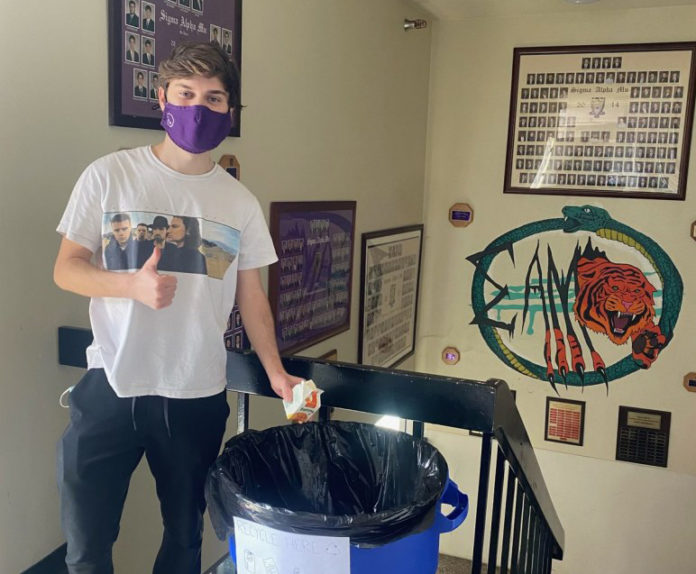Julia Orozco was first introduced to the idea of sustainability with the rise of metal straws in 2016. However, Orozco quickly realized that to make a greater impact, larger institutions needed to make a change. As a result, Orozco joined the Environmental Student Assembly in Fall 2019 to meet people who were also passionate about sustainability and improving sustainability efforts at USC specifically.
”We’re only here for four years, whereas the community we’re in has been staying the same,” Orozco said. “We tend to be [more] affluent than the surrounding community, so we need to take more steps to reduce our environmental impact given that those around us don’t have necessarily have the same resources, and people of color and lower income communities tend to experience more environmental impact than than their higher income and white counterparts.”
Orozco quickly identified a major problem on campus: fraternity parties and gatherings generated a lot of waste, and a lot of the easily recyclable items being thrown away ended up in landfills. Since then, Orozco, a senior majoring in public policy and ESA director of advocacy, has worked on and off to help implement recycling measures in fraternity houses on The Row, by providing flyers and helping them set up recycling bins.
“Greek life is such an important part of USC’s culture, and a lot of what our administration does sort of caters a lot to it, or to students in Greek life,” Orozco said. “I think that these fraternities sending the message to the administration by recycling really puts pressure on the administration to incorporate sustainability campuswide, whether it be more recycling bins on campus, or compost on campus. By showing them that students, especially those of such organizations on campus, want to become more green really pushes them to also become more green.”
Orozco originally began the project in Fall 2019 alongside Isabella Caltabiano, who graduated in 2020. Since sorority houses had already implemented recycling measures, Orozco and Caltabiano focused on introducing similar measures to fraternity houses. Later that semester, Sigma Chi became the first fraternity to implement recycling measures. However, Orozco said that because the project started in the middle of the fall semester, a lot of fraternities had already finalized their semester budgets, and it was not financially viable for them to buy the recycling bins needed at that time.
The following semester, Orozco and Caltabiano attempted to revamp the recycling initiative, before the coronavirus pandemic put their plans on hold again.
Despite Caltabiano’s graduation that spring, Orozco still knew she wanted to make her project a reality. However, due to the continued virtual learning environment, Orozco was unable to make any additional progress throughout the Fall 2020 semester either.
“I was hoping to pick the project back up in the fall because we were intending on being in person,” Orozco said. “But since we went fully online again with no chance of us going back in person, we halted it, since we didn’t think anyone would be on campus, so it wouldn’t be worthwhile to start the initiative again.”
However, when more people returned to campus this spring semester and the University announced its plans to reopen completely for the Fall 2021 semester, Orozco saw the perfect opportunity to start up the project once again. In January, Orozco reached out to Interfraternity Council Vice President Nolan Mac Ban to help her develop a list of fraternity contacts and ensure the project could effectively restart.
“I was like, ‘Yeah, I’d be more than happy to help you restart this initiative and provide you with the contacts of presidents, treasurers and vice presidents of each of the houses,’” said Mac Ban, a junior majoring in business administration and cinematic arts.
Since then, Orozco helped Delta Tau Delta, Phi Sigma Kappa, Pi Kappa Epsilon and Sigma Alpha Mu implement recycling measures at each of their houses.
Delta Tau Delta President Camilo Daza Manga first heard about the initiative from Caltabiano when it originally started in 2019.
“I wasn’t in a leadership position in my house yet at the time, but I do remember [Caltabiano] starting, then reaching out to a couple of houses,” Daza Manga said. “When Julia reached out to me earlier in January I was like, ‘Yeah, totally.’ I mean, it’s just a handful of recycling bins. We already have gardens, cleaning services and all that type of stuff, so it was an easy transition.”
The Delta Tau Delta house has been recycling for about three weeks, with recycling bins on two of the house’s three floors. Daza Manga said that Orozco helped the fraternity get a laminated sign from the City of LA that shows exactly what can and can’t be recycled.
Daza Manga said there have not been any difficulties adapting to the new recycling initiatives. The members have been putting food scraps in the bins and those living in the house have easily been able to recycle cans, bottles, Amazon packages and other recyclable materials.
“I think it’s important for everybody, not just organizations [to recycle]. I think it’s a top-to-bottom thing, like big corporations doing all that type of stuff as well,” Daza Manga said. “But I feel putting our best foot forward not only, I guess, represents us in a good light but just makes us feel a little bit better about kind of contributing towards things. I think it’s something that was a little bit past due for us.”
Phi Sigma Kappa President Frank Yokas also worked with Orozco to implement the recycling initiative in his fraternity house.
“It’s been awesome. There’s definitely less trash around the property which is always a good thing,” Yokas said. “It’s a lot cleaner. We’ve paired the recycling bin with the trash bins. So, you obviously have that option every time you walk up to a bin.”
Yokas said that because of the house’s location, there is a lot of foot traffic around the house, and that many people experiencing homelessness look for cans to recycle in the house’s dumpster. Since the house began recycling, giving the cans away became easier.
According to ESA Executive Director Jackson FitzGerald, one of ESA’s focuses is to advocate sustainability to all students, and focusing on a group with a high concentration of students, such as Greek life is a good way to build on the sustainability efforts that have already been made within residence halls.
In Spring 2020, ESA implemented waste reducing initiatives throughout University housing, adding composting to several residential buildings, including Webb Tower, New North Residential College and Nemirovsky Residential College. To celebrate this, the Undergraduate Student Government held a Zero Waste Carnival in February 2020, in partnership with ESA and the USC Residential Housing Association.
“[It’s awesome] that Julia was able to push us through during the pandemic because I know that especially for us and some of the other groups doing advocacy on campus, that getting anything done over the past few months has been really hard, because it’s not like you can meet with people,” Fitzgerald said. “This is definitely one of the biggest student-led advocacy changes that we’ve seen on campus during the pandemic, and so I’m super proud of all the work that Julia has done, especially just doing it in her free time.”


















